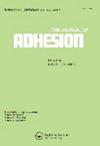Effect of carbon nanotubes on fatigue cracking of asphalt mixtures modified by styrene-ethylene/propylene-styrene
IF 2.3
4区 材料科学
Q2 ENGINEERING, CHEMICAL
引用次数: 0
Abstract
ABSTRACT Fatigue cracking is a significant cause of failure in flexible pavements at moderate temperatures. Neat bitumen cannot properly perform at all temperatures and environmental conditions due to the increasing traffic volume. Consequently, this study examined the simultaneous usage of carbon nanotubes (CNTs) and the styrene-ethylene/propylene-styrene (SEPS) polymer as bitumen modifiers. The linear amplitude sweep (LAS) test and surface free energy (SFE) theory were used to determine the rheological characteristics and thermodynamic parameters of neat and modified bitumens, respectively. Using the SEPS nanocomposite up to 6% increased the fatigue life and moisture damage resistance of the asphalt mixtures by improving thermodynamic parameters such as adhesive free energy in dry and wet conditions. According to the LAS results, the modified bitumen outperformed the neat bitumen in terms of fatigue life under different strain levels. The fatigue life of the asphalt mixtures also decreased as the temperature increased from 10 to 20°C. However, for the mixtures containing the SEPS nanocomposite, the reduction in fatigue life was less noticeable due to the lower temperature sensitivity of the modified bitumen. The mixtures containing 6% SEPS nanocomposite demonstrated the highest performance.碳纳米管对苯乙烯-乙烯/丙烯-苯乙烯改性沥青混合料疲劳开裂的影响
摘要疲劳开裂是柔性路面在中等温度下失效的重要原因。由于交通量的增加,干净的沥青无法在所有温度和环境条件下正常使用。因此,本研究考察了碳纳米管(CNTs)和苯乙烯-乙烯/丙烯-苯乙烯(SEPS)聚合物作为沥青改性剂的同时使用。采用线性振幅扫描(LAS)试验和表面自由能(SFE)理论分别测定了纯沥青和改性沥青的流变特性和热力学参数。使用高达6%的SEPS纳米复合材料通过改善热力学参数,如在干燥和潮湿条件下的粘合剂自由能,提高了沥青混合物的疲劳寿命和抗湿损伤性。根据LAS结果,在不同应变水平下,改性沥青的疲劳寿命优于纯沥青。沥青混合料的疲劳寿命也随着温度从10°C升高到20°C而降低。然而,对于含有SEPS纳米复合材料的混合物,由于改性沥青的温度敏感性较低,疲劳寿命的降低不太明显。含有6%SEPS纳米复合材料的混合物表现出最高的性能。
本文章由计算机程序翻译,如有差异,请以英文原文为准。
求助全文
约1分钟内获得全文
求助全文
来源期刊

Journal of Adhesion
工程技术-材料科学:综合
CiteScore
5.30
自引率
9.10%
发文量
55
审稿时长
1 months
期刊介绍:
The Journal of Adhesion is dedicated to perpetuating understanding of the phenomenon of adhesion and its practical applications. The art of adhesion is maturing into a science that requires a broad, coordinated interdisciplinary effort to help illuminate its complex nature and numerous manifestations.
 求助内容:
求助内容: 应助结果提醒方式:
应助结果提醒方式:


